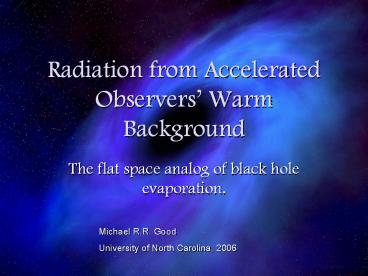Radiation from Accelerated Observers - PowerPoint PPT Presentation
1 / 37
Title:
Radiation from Accelerated Observers
Description:
Stephen Fulling 1973. Stephen Hawking 1974. History of the Unruh effect. Paul Davies 1974. ... Hawking Radiation from Unruh. At infinity V2 1 so the ... – PowerPoint PPT presentation
Number of Views:243
Avg rating:3.0/5.0
Title: Radiation from Accelerated Observers
1
Radiation from Accelerated Observers Warm
Background
- The flat space analog of black hole evaporation.
Michael R.R. Good University of North Carolina,
2006
2
Road Map
- Introduction/History
- Construction of the Unruh effect
- How can the Unruh effect explain Hawking
radiation? - Unruh Radiation versus Unruh Effect
- How does an accelerated observer radiate energy
to an inertial detector? - Experimental Prospects
- How can the Unruh effect be experimentally
verified? - Outlook/Research directions
3
What is the Unruh Effect?
- Warm vacuum
- Same state, different descriptions.
- Path dependent vacuum.
4
The Result
Constant velocity
Accelerating
At Rest
5
History of the Unruh Effect
- Schrodinger in 1939.
- Stephen Fulling 1973.
- Stephen Hawking 1974.
6
History of the Unruh effect
- Paul Davies 1974.
- Bill Unruh 1975.
- Bisognano and Wichmann 1975.
- QFT in CST
7
Dimensional Considerations
Newtonian Mechanics
Special Relativity
Quantum Mechanics
Thermodynamics
8
Origin of Unruh Effect
- Different notions of modes?
- Where does the energy come from?
9
Derivation of the Unruh Effect
- Unruhs quantization modes method
- Field is expanded in modes
- Number operator in Minkowski vacuum is
calculated.
10
Review of QFT in Minkowski
11
Review Cont.
12
Review of Acceleration Coordinates
13
Massless Klein-Gordon in Rindler
14
Analytically Extended Modes
15
Bogolubov Transformation
16
Thermal Spectrum of Particles
17
Davies Moving Mirror
- Motion of a single reflecting boundary can create
particles. - Excited field modes causes particles to appear.
- The detector responds to a flux of particles from
the mirror that is constant in time and has the
spectrum of thermal radiation.
18
Bisognano and Wichmanns proof
- Theorem about the action of complex Lorentz
transformations on the vacuum. - Minkowski vacuum is a thermal state for the boost
Hamiltonian (axiomatic QFT)
19
Unruh Event Horizon
20
Hawking Radiation
- Occurs on the event horizon of a black hole
- A virtual particle pair is created on the event
horizon
21
Hawking and Unruh
- Hawking and Unruh analogy, where is the
surface gravity of the black hole
22
Derivation of Hawking Radiation
- Static observer near black hole detects
- Static observer at infinity detects
23
Hawking Radiation from Unruh
- At infinity V2? 1 so the temperature observed is
- Assume the quantum state of some scalar field ?
looks like Minkowski vacuum as seen by freely
falling observers near black hole.
24
Opposition to Unruh Radiation
- Exact calculation in scalar electrodynamics.
(Ford and OConnell, 2006) - System in equilibrium.
- Driven while radiating.
- Balance with no net flux.
- Thermalization without radiation.
25
Experimental Prospects
- Acoustic black hole (Unruh)
- Spin transitions due to vacuum (Bell)
26
Experimental Prospects
- Penning trap (Rogers)
- Ionized gas (Yablonovitch)
- Particles in crystal (Darbinyan)
27
Experimental Prospects
- Lasers (Chen, 1999)
28
Detecting Unruh Radiation?
29
Interesting Research Directions
- Lasers in the vacuum
- Geometric algebra interpretation of Unruh
- Unruh effect and causality
- GEMS maps
- Classical correspondence
- Spectral deformation theory
30
Important References
- Pedagogical
- K. Thorne, Black Holes and Time Warps, 1994. -
Chapter 12 "Black holes evaporate", especially p.
444 (box 12.5) "Acceleration Radiation". - A. Kanwal, Zero-Point Energy Presentation,
Rutgers University. - Birrell and Davies, Quantum fields in curved
space, 1982. - Wald, Black hole thermodynamics, 1994.
- The pioneering papers
- W. Unruh, Notes on black hole evaporation. 1976.
- P. Davies, Scalar particle production, 1975.
- Bisognano and Wichmann, On the duality condition
for a hermitian scalar field, 1975. - Opposition to the radiation
- P. Grove, Inertial observers interpretation of
the detection of radiation by linearly
accelerated particle detectors. 1985. - Ford and OConnell, Is there Unruh radiation?
2006. - Experiments have the final word
- P. Chen, Testing Unruh radiation with
ultra-intense lasers. 1999. - H. Rosu, Unruh effect Toward Experiments? 2001.
31
(No Transcript)
32
(No Transcript)
33
(No Transcript)
34
(No Transcript)
35
(No Transcript)
36
(No Transcript)
37
Outlook
- Research plan for the next 12 months
- Detailed investigation of Unruh radiation
experiments. - Help with designing experimental tests of Unruh
radiation using ultra-intense lasers to
accelerate electrons. - Further investigation of the Unruh effect and
its relationship with Hawking radiation - Explore Unruh radiation with geometric algebra.
- Long term objectives
- Understanding quantum field theory in curved
spacetime, black hole thermodynamics - Understanding the nature of the quantum event.

